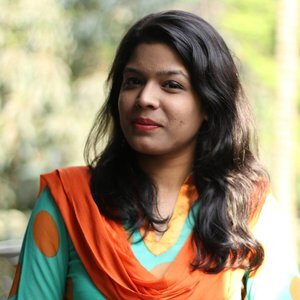No More Shame. Period.
Just Peoples project leader Sharmin explains period poverty in Bangladesh - and how she’s turning things around.
Sharmin Kabir
Ending Period Poverty is Empowering Girls with Freedom
How would you feel if you woke up someday on stained cloth of period blood knowing that you do not have any healthy menstrual product to manage that? How would you feel going to work for around 10 hours wearing just a piece of cloth to absorb menstrual blood as you can not afford to buy a pad to change?
I hope you never face such a situation. But, millions of girls and women in Bangladesh face this every month in their periods because they do not have enough money to buy napkins or pads every month. We call it Period Poverty or Poor Menstrual Hygiene Management. While living from hand to mouth is their every day’s struggle, spending $1.40 for a sanitary pad monthly is a luxury for them.
You will be surprised to know that 95% of the girls and women in Bangladesh cannot afford healthy menstrual products. This is putting 73% of them at risk of cervical cancer, uterus cancer, urinary tract cancer and some other serious health hazards. Apart from that, the inability to manage menstruation in a healthy way causes adolescent girls in Bangladesh to miss 3 to 4 school days monthly and hamper working women’s productivity. As such, this is affecting poor working women’s economic solvency.
Women learn about menstrual hygiene and management.
Period Poverty is also leading to many girl child marriages. This is a cycle like when a girl gets her period she absents her school days that results in poor school performances. Continuation of this, leads her to drop out of school. When the parents find their daughters are not going to school or continuing poor school performance, they find it easier to get their daughters married off.
However, Period Poverty is more than just not having a healthy menstrual hygiene product. It also includes not having an empathetic environment towards the period. In Bangladesh, period is considered as a social stigma and taboo. Families, schools and even the parents do not prepare a girl for her period because initiation of such discussion is considered as a shameful topic.
School girls learn to be proud of their bodies.
It needs time to raise cultural awareness. In Bangladesh, we are providing comprehensive menstrual education to adolescent girls and boys and to their community people through interactive dialogue and sessions, educating the schools, factories and communities with an illustrated story-based Comic Book and bringing behavioral change through Reusable Sanitary Napkins. We include boys in the sessions so they can also understand that periods are powerful parts of being a girl or woman, and will learn to respect and support their sisters and classmates now, and eventually their wives and daughters.
Working women receive reusable pads.
Reusable Sanitary Napkins are very effective in ending Period Poverty especially for the under-privileged girls and women. Our napkins can be used for 12 period cycles. This napkin is cost-effective as the users do not need to buy it every month, environment friendly as it is made of cloth and healthy as it does not use any bleach or chemicals.
A young girl receives a pack of reusable pads
Since last year, we have been distributing our Napkins and the impacts are inspiring. This is overwhelming seeing how a single napkin can empower girls and women with freedom, self-esteem and empowerment from low-income families. They now can go to work without any hesitation, students can continue their schooling without any uncomfortability and the housewives are enjoying their daily chores being tension free. This is changing an adolescent girl’s life significantly. By our sessions and products, we are injecting positivity before the society injects stigma, shame and taboo.
Simply, ending Period Poverty for the girls and women can bring a large social change and impact. Let us build a Period friendly world ending Period Poverty, together.
Sharmin with high school students after a period positivity workshop.






